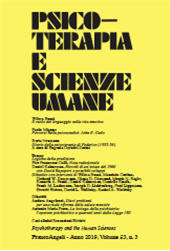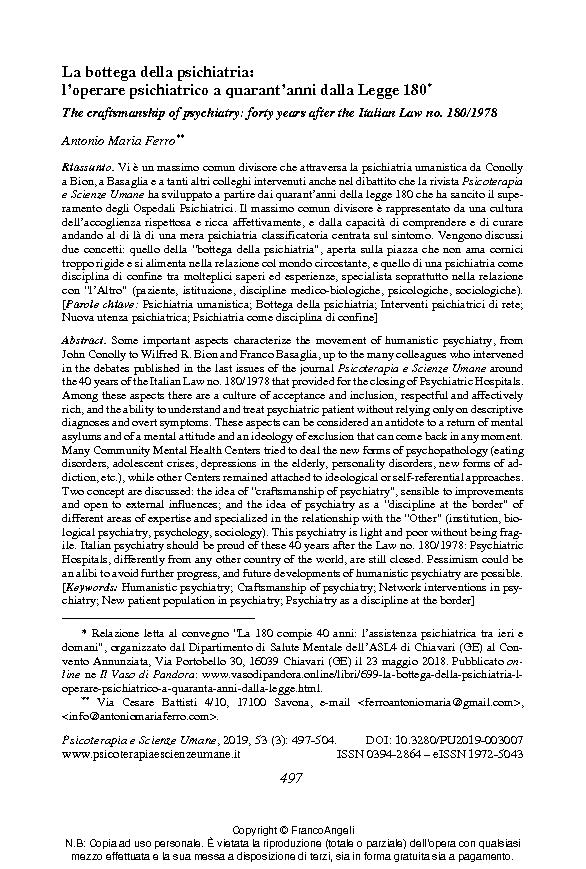La bottega della psichiatria : l'operare psichiatrico a quarant'anni dalla Legge 180.
497-504 p.
Vi è un massimo comun divisore che attraversa la psichiatria umanistica da Conolly a Bion, a Basaglia e a tanti altri colleghi intervenuti anche nel dibattito che la rivista Psicoterapia e Scienze Umane ha sviluppato a partire dai quarant'anni della legge 180 che ha sancito il superamento de-gli Ospedali Psichiatrici. Il massimo comun divisore è rappresentato da una cultura dell'accoglienza rispettosa e ricca affettivamente, e dalla capacità di comprendere e di curare an-dando al di là di una mera psichiatria classificatoria centrata sul sintomo. Vengono discussi due concetti: quello della "bottega della psichiatria", aperta sulla piazza che non ama cornici troppo rigide e si alimenta nella relazione col mondo circostante, e quello di una psichiatria come disciplina di confine tra molteplici saperi ed esperienze, specialista soprattutto nella relazione con "l'Altro" (paziente, istituzione, discipline medico-biologiche, psicologiche, sociologiche). [Testo dell'editore].
Some important aspects characterize the movement of humanistic psychiatry, from John Conolly to Wilfred R. Bion and Franco Basaglia, up to the many colleagues who intervened in the debates published in the last issues of the journal Psicoterapia e Scienze Umane around the 40 years of the Italian Law no. 180/1978 that provided for the closing of Psychiatric Hospitals. Among these aspects there are a culture of acceptance and inclusion, respectful and affectively rich, and the ability to understand and treat psychiatric patient without relying only on descriptive diagnoses and overt symptoms. These aspects can be considered an antidote to a return of mental asylums and of a mental attitude and an ideology of exclusion that can come back in any moment. Many Community Mental Health Centers tried to deal the new forms of psychopathology (eating disorders, adolescent crises, depressions in the elderly, personality disorders, new forms of addiction, etc.),
while other Centers remained attached to ideological or self-referential approaches. Two concept are discussed: the idea of "craftsmanship of psychiatry", sensible to improvements and open to external influences; and the idea of psychiatry as a "discipline at the border" of different areas of expertise and specialized in the relationship with the "Other" (institution, biological psychiatry, psychology, sociology). This psychiatry is light and poor without being fragile. Italian psychiatry should be proud of these 40 years after the Law no. 180/1978: Psychiatric Hospitals, differently from any other country of the world, are still closed. Pessimism could be an alibi to avoid further progress, and future developments of humanistic psychiatry are possible. [Publisher's text].
Fa parte di
Psicoterapia e scienze umane : LIII, 3, 2019-
Articoli dello stesso fascicolo (disponibili singolarmente)
-
Informazioni
Codice DOI: 10.3280/PU2019-003007
ISSN: 1972-5043
PAROLE CHIAVE
- Psichiatria umanistica, Bottega della psichiatria, Interventi psichiatrici di rete, Nuova utenza psichiatrica, Psichiatria come disciplina di confine
- Humanistic psychiatry, Craftsmanship of psychiatry, Network interventions in psychiatry, New patient population in psychiatry, Psychiatry as a discipline at the border



